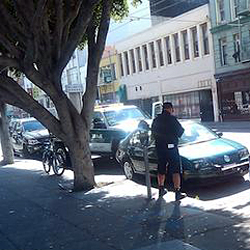But in some cases, the cost of collecting the revenue outweighed the benefits.
In San Mateo County, for example, the court and county collected $31,350, of which $28,740 went to collections services and to pay a contractor to reprogram the online traffic system that people use to pay fines. The remaining $2,610 covered the time staff spent setting up and tracking the program.
“In hindsight, it probably wasn’t worth it,” said Neal Taniguchi, director of finance for the San Mateo County Superior Court. “We really didn’t make any money off of it. We ended up having to spend more time to make sure people qualified for the program, and we spent a considerable amount of time setting up the program.”
Still, Margie Borjon-Miller, assistant director of the finance division at the Administrative Office of the Courts, which administered the program in all 58 counties, said it generally “helps the courts, the state and local governments to generate revenues that would have otherwise gone uncollected.”
The program did not apply to parking tickets or citations for driving under the influence or reckless driving.
But for people with long overdue traffic tickets, the program provided an opportunity to clear their record.
“While collecting overdue court-ordered fines is certainly important, what is also important is that thousands of people were able to clear up overdue debts, which in many cases helped them to move on with their lives,” said Leanne Kozak, a spokeswoman for the Administrative Office of the Courts.
Some of the money raised will also go to the state court system, which has seen its budget cut by millions of dollars over the past several years.
Kozak said she received dozens of calls from people wanting to participate in the amnesty program.
“It wasn’t the dollar amount that was so important, it was people solving their life problems,” Kozak said.
One woman said she wanted to clear her record of tickets so that she could enlist in the military.
California offered similar ticket amnesty programs in 1992 and 1996. In December, the Administrative Office of the Courts will report to the Legislature on how much money this year's program generated and the number of cases it resolved.
This story was produced by The Bay Citizen, a project of the Center for Investigative Reporting. Learn more at www.baycitizen.org.
 They would only owe half the fines and fees if they paid off their debts between January and June of this year. In exchange, the state would share the money collected with local governments and trial courts.
They would only owe half the fines and fees if they paid off their debts between January and June of this year. In exchange, the state would share the money collected with local governments and trial courts.